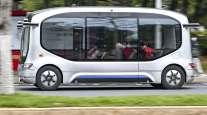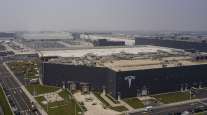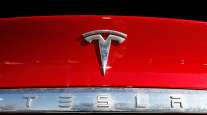Managing Editor, Features and Multimedia
Embark Self-Driving Truck Completes Coast-to-Coast Test Run

A self-driving truck operated by tech startup Embark recently completed a test run from Los Angeles to Jacksonville, Fla., which the company hailed as the first coast-to-coast journey by an automated truck.
The modified Peterbilt tractor, outfitted with an array of sensors and guided by self-driving software, traveled 2,400 miles over five days along the length of Interstate 10 across the southern United States.
Embark’s onboard technology handled nearly all of the highway driving, but a driver was behind the wheel at all times, watching the road and ready to take over if needed.
“The driver is always responsible for being attentive and making sure that everything is safe, but the driver will regularly go many hours down the road without actually being involved, and when they are involved, it’s usually just for a few seconds,” Embark CEO Alex Rodrigues said in an interview with Transport Topics.

Rodrigues
The cross-country run began in late January and the truck was scheduled to complete its return trip to Los Angeles on Feb. 6.
Embark’s current system represents Level 2 automation, where the driver is required to actively monitor the vehicle’s progress as it drives itself on the highway.
The company’s goal, however, is to further develop its technology to enable Level 4 automation, where the vehicle can travel on limited, specific highway routes with no driver at all.
“That will be [our] first commercial product and will hopefully be available in a few years,” Rodrigues said.
Embark envisions these Level 4 driverless trucks operating as part of a redesigned freight system, where trailers are exchanged between local drivers and driverless trucks at freight hubs situated along highways.
The autonomous trucks would haul trailers from hub to hub on the freeway, but local drivers would continue to handle the more complex driving tasks associated with the beginning and end of each trip — from origin to highway and from highway to final destination.
Uber’s Advanced Technologies Group, another developer of self-driving truck technology, also has promoted the transfer hub model. In a recent blog post, Uber ATG argued that these freight hubs could generate an increase in local truck driving jobs that would more than offset an eventual decline in longhaul jobs.
Embark’s first coast-to-coast run took the normal five days to complete because the driver was still operating within hours-of-service limits. A truly autonomous Level 4 truck, however, would be able to complete the same trip in just two days by operating around the clock, Rodrigues said. “Obviously that would radically change the dynamics of freight.”

The tractor outfitted with Embark’s self-driving technology is seen on I-10. (Embark)
In addition to drastically boosting productivity and offering economic benefits, the much shorter transit time also could support the growing e-commerce industry and just-in-time manufacturing strategies.
Although Embark’s truck pulled an empty trailer on the test run to Jacksonville, the technology company already is hauling freight on a long portion of I-10.
Since last year, the company has been transporting refrigerators for Electrolux, parent of the Frigidaire brand, on an automated freight route between Los Angeles and El Paso, Texas.

“The way we think about it is moving freight is one of the best ways to perform tests,” Rodrigues said. “It teaches us a lot about how you actually interact with loads, how the timing works, how locations for pickup and drop-off work. It makes the systems much more effective in the real world.”
Rodrigues said Embark has expanded its fleet of test vehicles to five trucks, up from a pair of trucks four months ago. By year’s end, the company plans to grow its fleet to 40 trucks.
Meanwhile, Embark is working with regulators at the state and federal level as it continues to refine its system, Rodrigues said.
He predicted that the first commercial deployments of autonomous trucks will likely happen through close partnerships with states, which provide a good, smaller scale test bed for the technology. That would eventually create a path to a federal approach as the technology proves itself, he said.
When Embark first introduces its system commercially, it will be as a factory-installed system offered through original equipment manufacturers rather than as an aftermarket kit, Rodrigues said.
“We think, longer term, that is how you’re going to get these vehicles out on the road.”
Embark currently has a formal partnership with Peterbilt Motors Co., which is installing specialized components designed to support self-driving on the trucks it sells to the technology developer, he said.
However, Embark aims to make its technology available on a range of makes and models, Rodrigues added.
Embark’s trucks use a combination of cameras, radar and lidar to track the vehicle’s environment, as well as a form of artificial intelligence to process the data captured by the sensors.
The company said its use of machine learning enabled it to complete its recent coast-to-coast run without undergoing the expensive and time-consuming process of premapping the entire route.
In the year ahead, Embark plans to test new routes while working to reduce the frequency of situations where the driver must intervene, Rodrigues said.
Embark, founded in 2016, is based in the San Francisco area and backed by venture capital firms such as Y Combinator, Data Collective and SV Angel.





